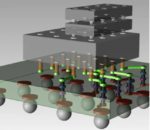While the leap from traditional SoC/IC designs to Three-Dimensional Integrated Circuits (3DICs) designs brings new benefits and opportunities, it also introduces new challenges. The benefits include performance, power efficiency, footprint reduction and cost savings. The challenges span design, verification, thermal… Read More
Author: Kalar Rajendiran
Successful 3DIC design requires an integrated approach
Unlocking the Power of Data: Enabling a Safer Future for Automotive Systems
The automotive industry is undergoing a major transformation; it is not about just connectivity and convenience anymore. Data is emerging as the driving force behind innovation and safety with vehicles becoming sophisticated data-driven machines. By unlocking the power of data, we can create safer vehicles and roads and usher… Read More
Ensuring 3D IC Semiconductor Reliability: Challenges and Solutions for Successful Integration
One of the most promising advancements in the semiconductor field is the development of 3D Integrated Circuits (3D ICs). 3D ICs enable companies to partition semiconductor designs and seamlessly integrate silicon Intellectual Property (IP) at the most suitable process nodes and processes. This strategic partitioning yields… Read More
100G/200G Electro-Optical Interfaces: The Future for Low Power, Low Latency Data Centers
Electrical copper interconnects, once the backbone of data center networks, are facing growing challenges. Rapid expansion of AI and ML applications is driving a significant increase in cluster sizes within data centers, resulting in substantial demands for faster I/O capabilities. While the surge in I/O requirements is … Read More
Synopsys – TSMC Collaboration Unleashes Innovation for TSMC OIP Ecosystem
As the focal point of the TSMC OIP ecosystem, TSMC has been driving important initiatives over the last few years to bring multi-die systems to the mainstream. As the world is moving quickly toward Generative AI technology and AI-based systems, multi-die and chiplet-based implementations are becoming essential. TSMC recently… Read More
Disaggregated Systems: Enabling Computing with UCIe Interconnect and Chiplets-Based Design
The world of computing is evolving rapidly, with a constant demand for more powerful and efficient systems. Generative AI has driven exponential growth in the amount of data that is generated and processed at very high data speeds and very low latencies. Traditionally, computing systems have been built using monolithic designs,… Read More
proteanTecs On-Chip Monitoring and Deep Data Analytics System
State-of-the-art electronics demand high performance, low power consumption, small footprint and high reliability from their semiconductor products. While this imperative is true across many different market segments, it is critical for applications such as the automotive/autonomous driving and data centers. As electronic… Read More
Transformers Transforming the Field of Computer Vision
Over the last few years, transformers have been fundamentally changing the nature of deep learning models, revolutionizing the field of artificial intelligence. Transformers introduce an attention mechanism that allows models to weigh the importance of different elements in an input sequence. Unlike traditional deep learning… Read More
Cyber-Physical Security from Chip to Cloud with Post-Quantum Cryptography
In our interconnected world, systems ranging from smart cities and autonomous vehicles to industrial control systems and healthcare devices have become everyday components of our lives. This fusion of physical and digital systems has led to a term called cyber-physical system (CPS). Ubiquitous connectivity is exposing the… Read More
Water Sustainability in Semiconductor Manufacturing: Challenges and Solutions
Water, the planet’s lifeblood, remains a finite and precious resource. The Earth’s total water supply has remained relatively constant over millennia. However, it is the uneven distribution of freshwater and the challenges of providing access to clean water that are causing stress in various parts of the world.… Read More




















The Name Changes but the Vision Remains the Same – ESD Alliance Through the Years